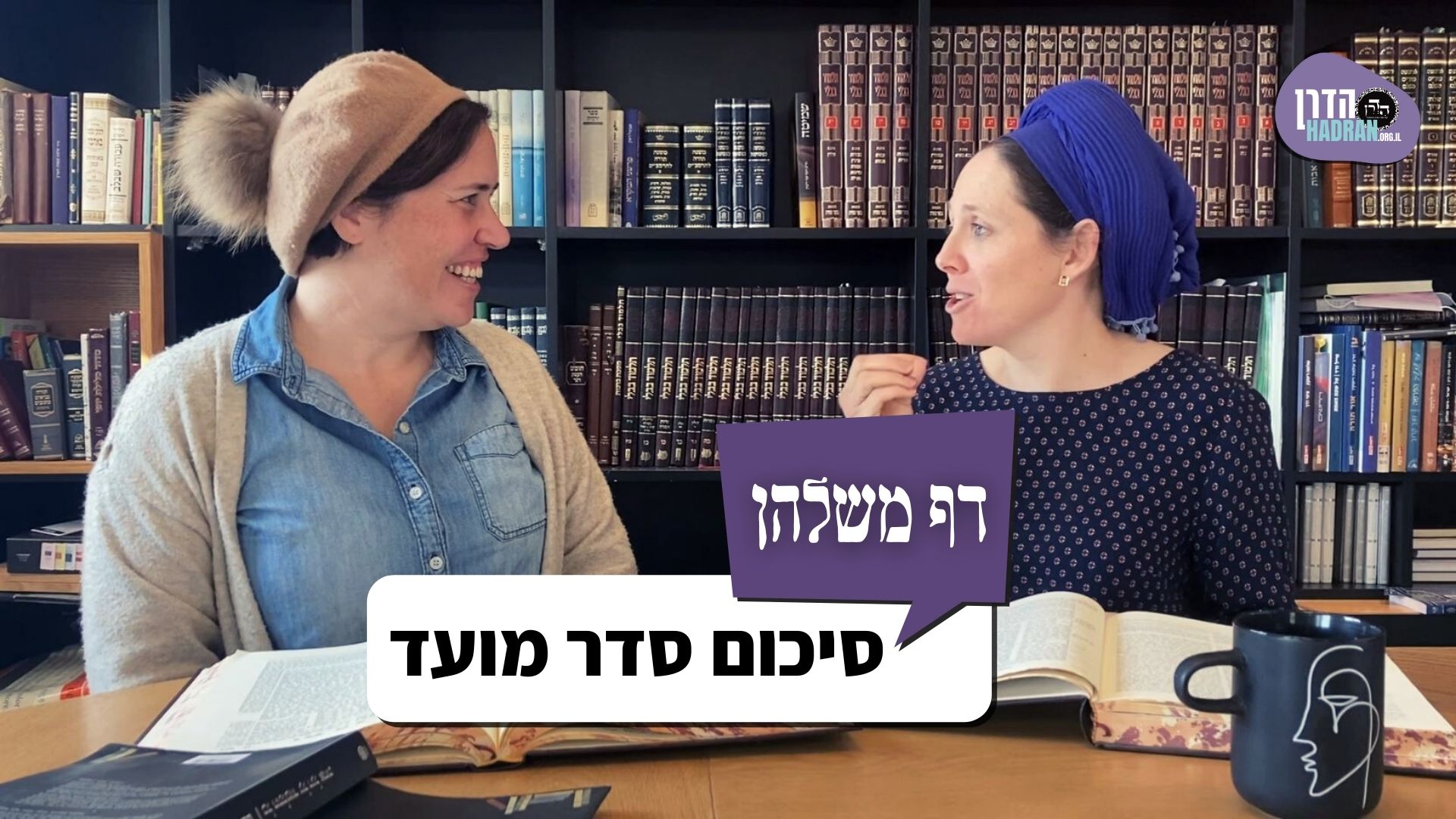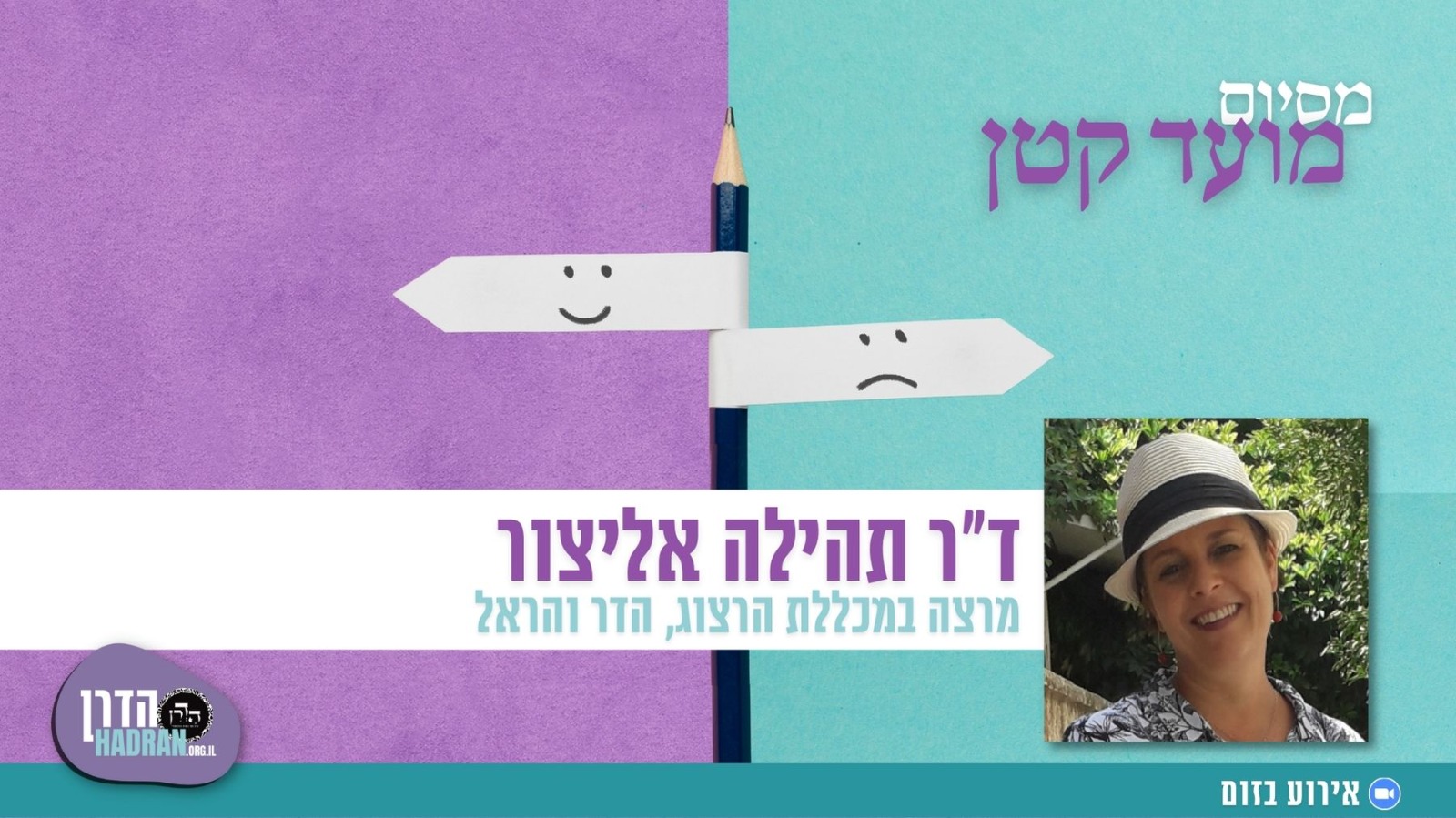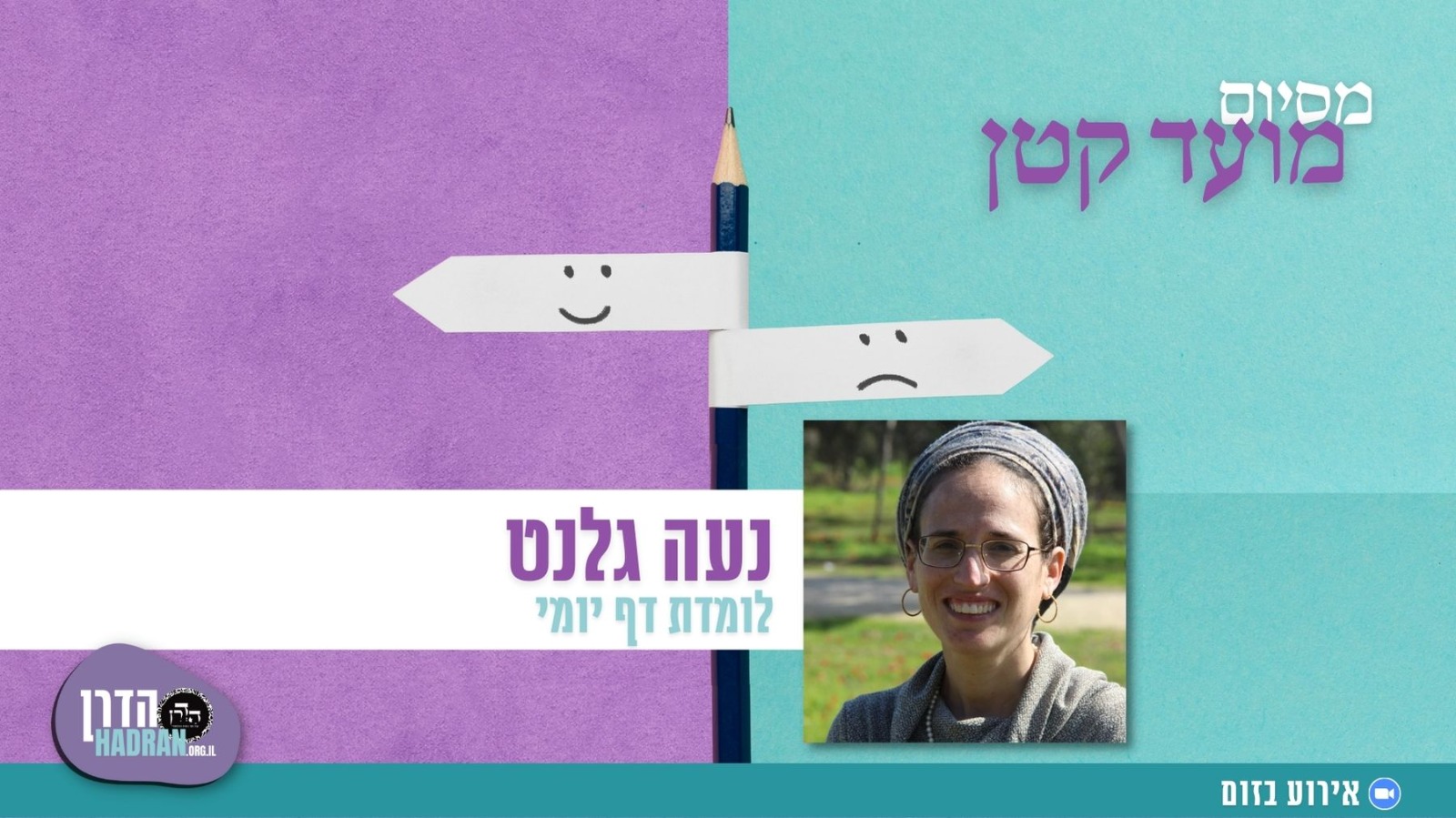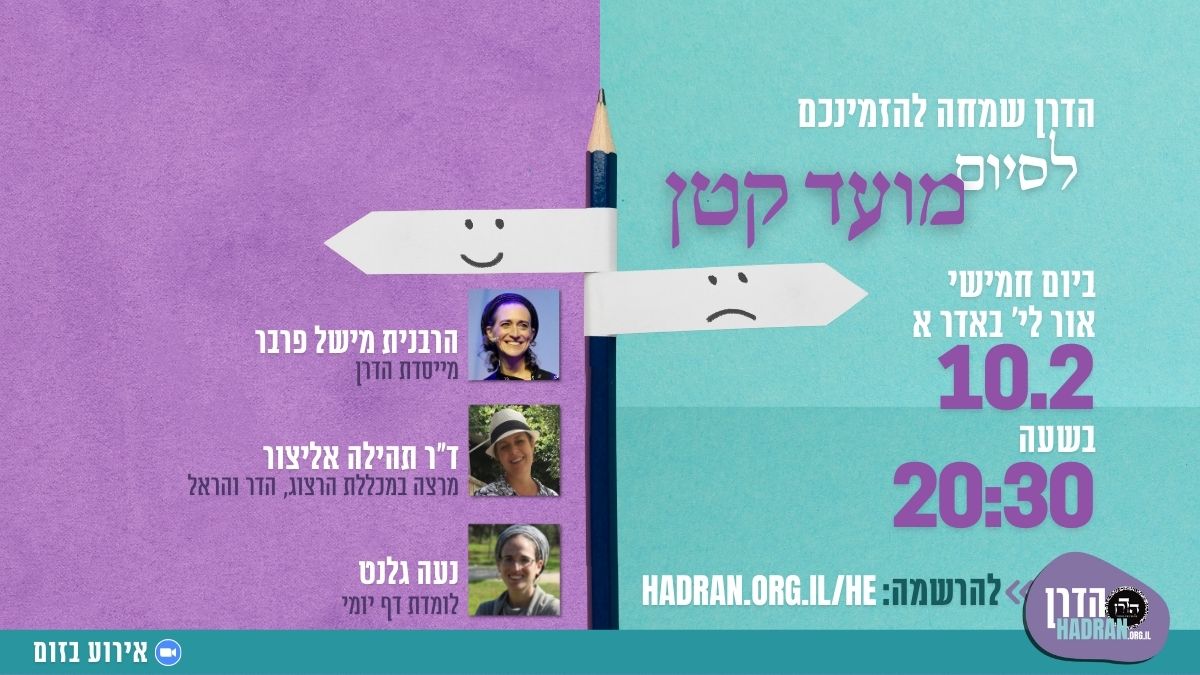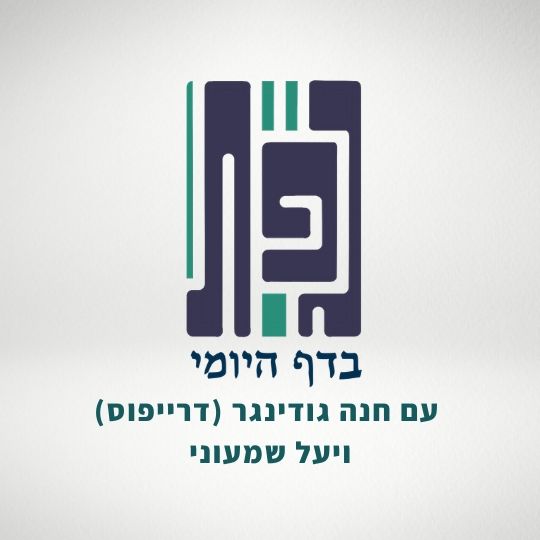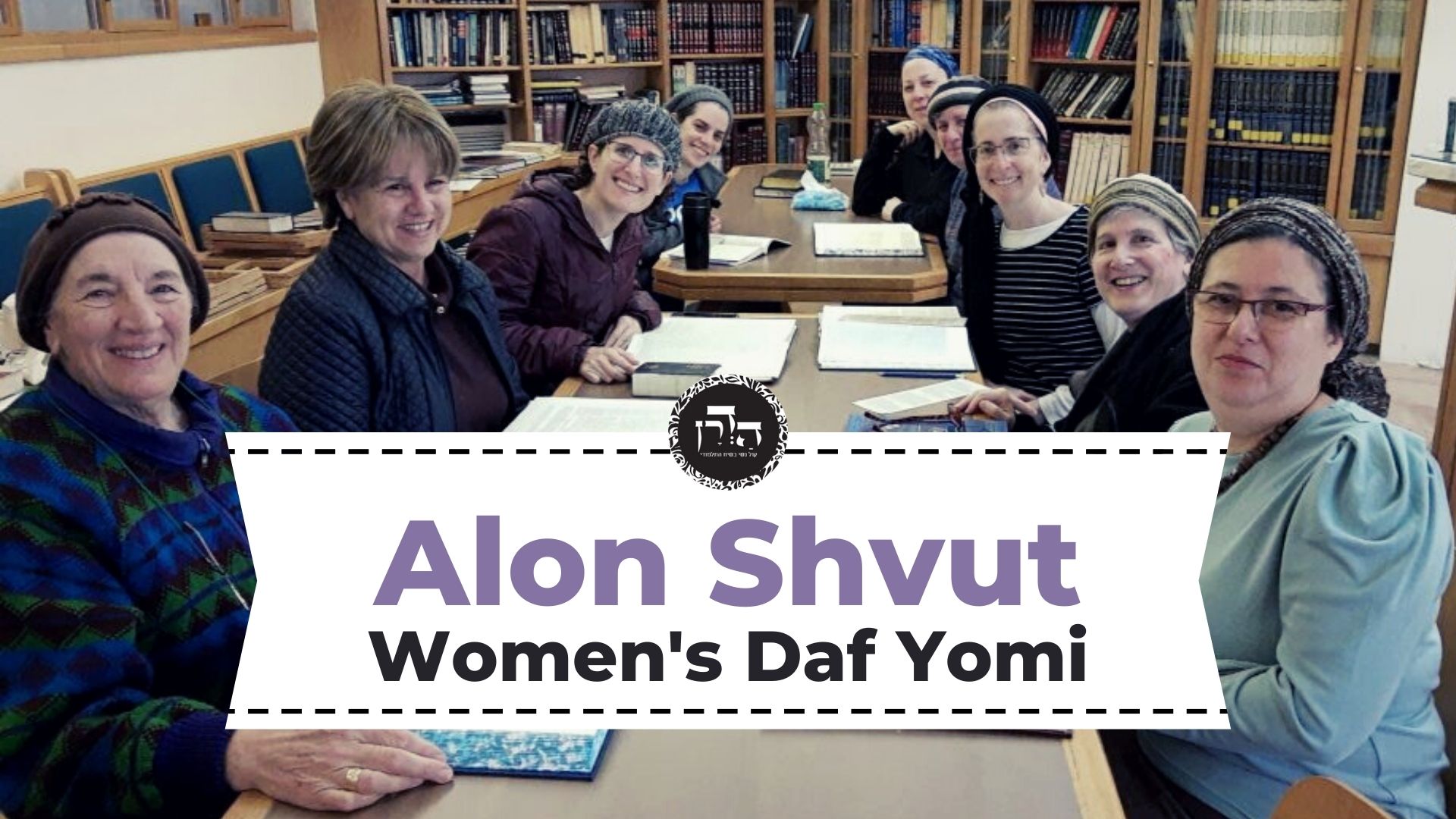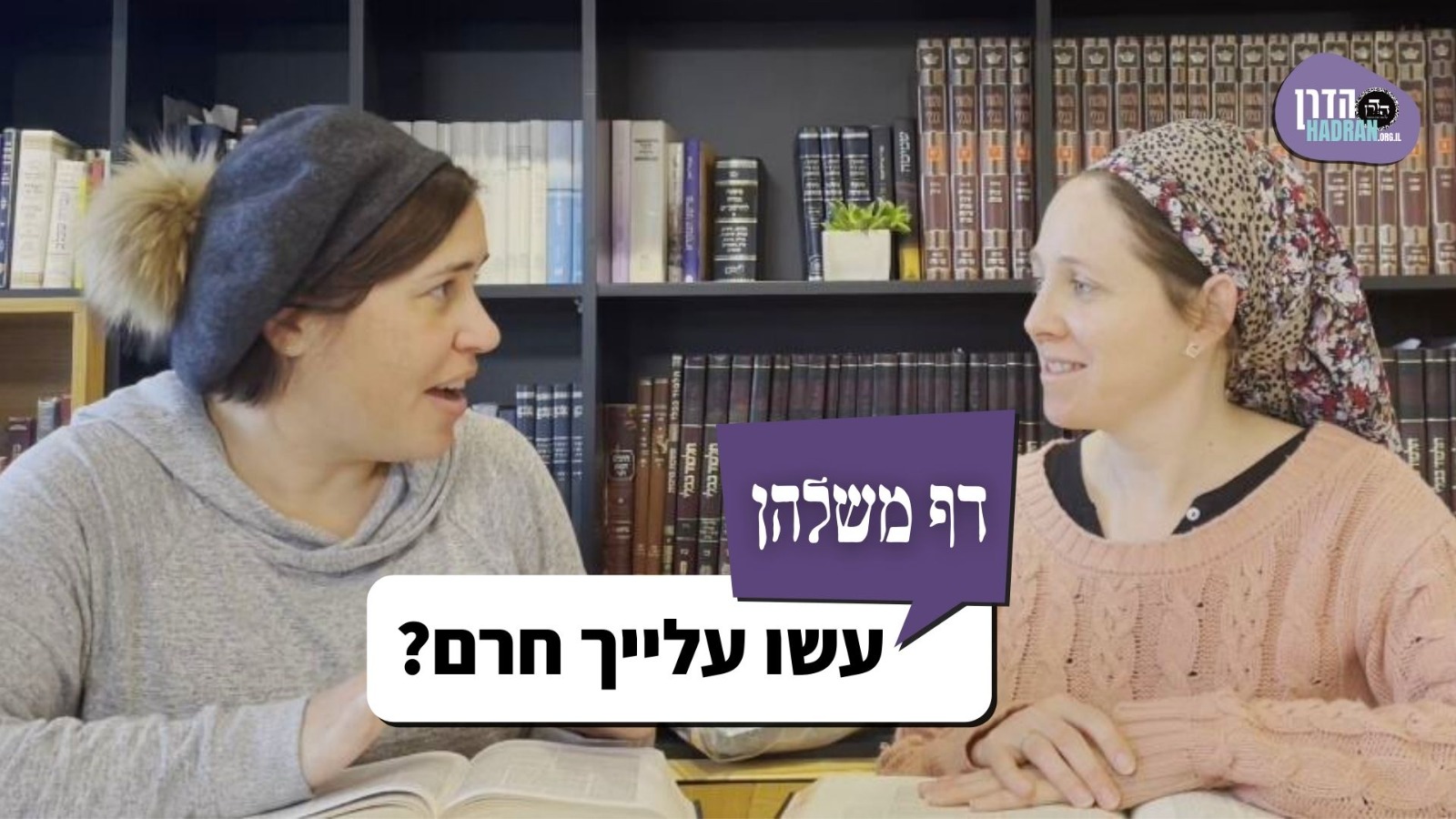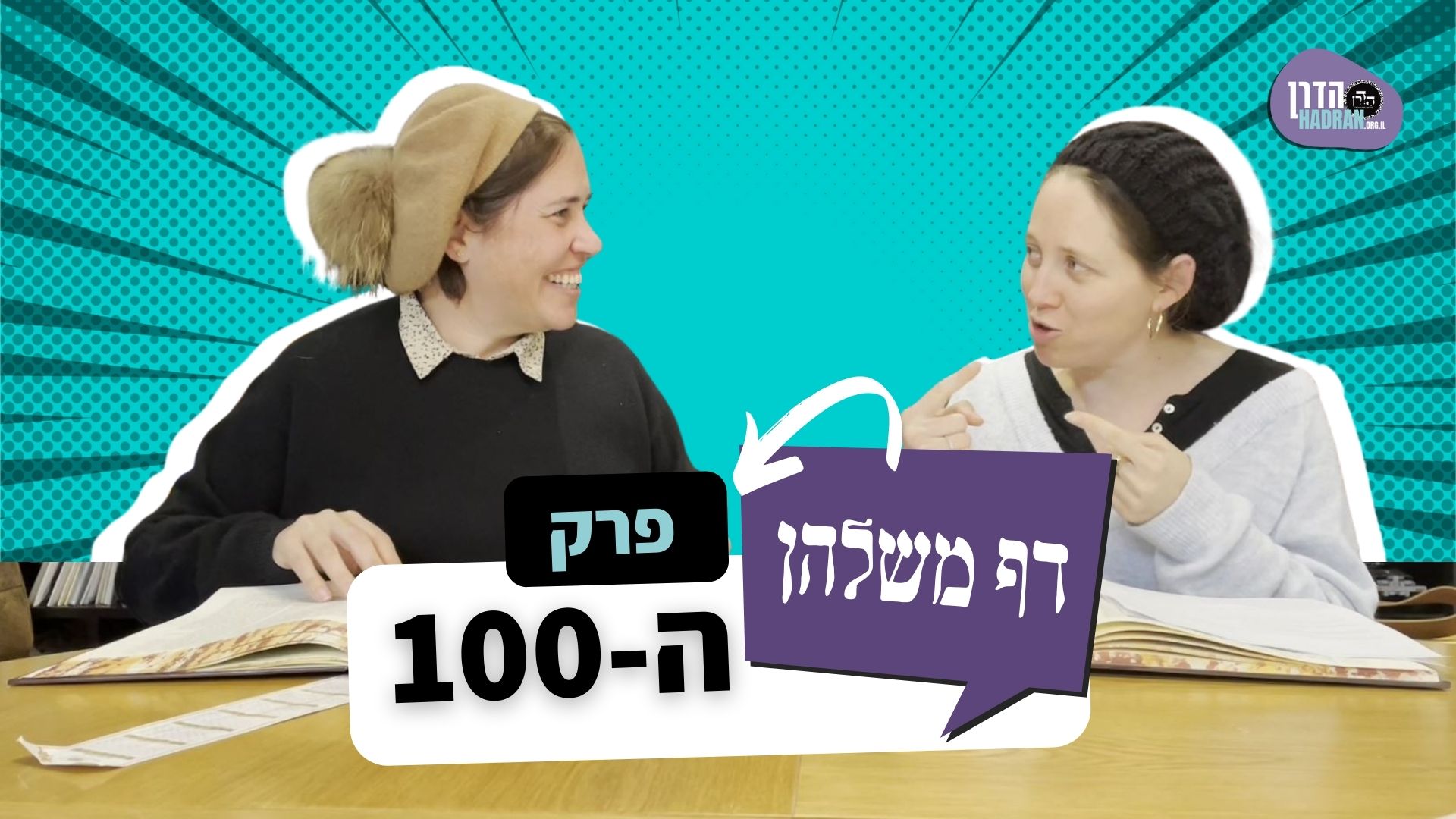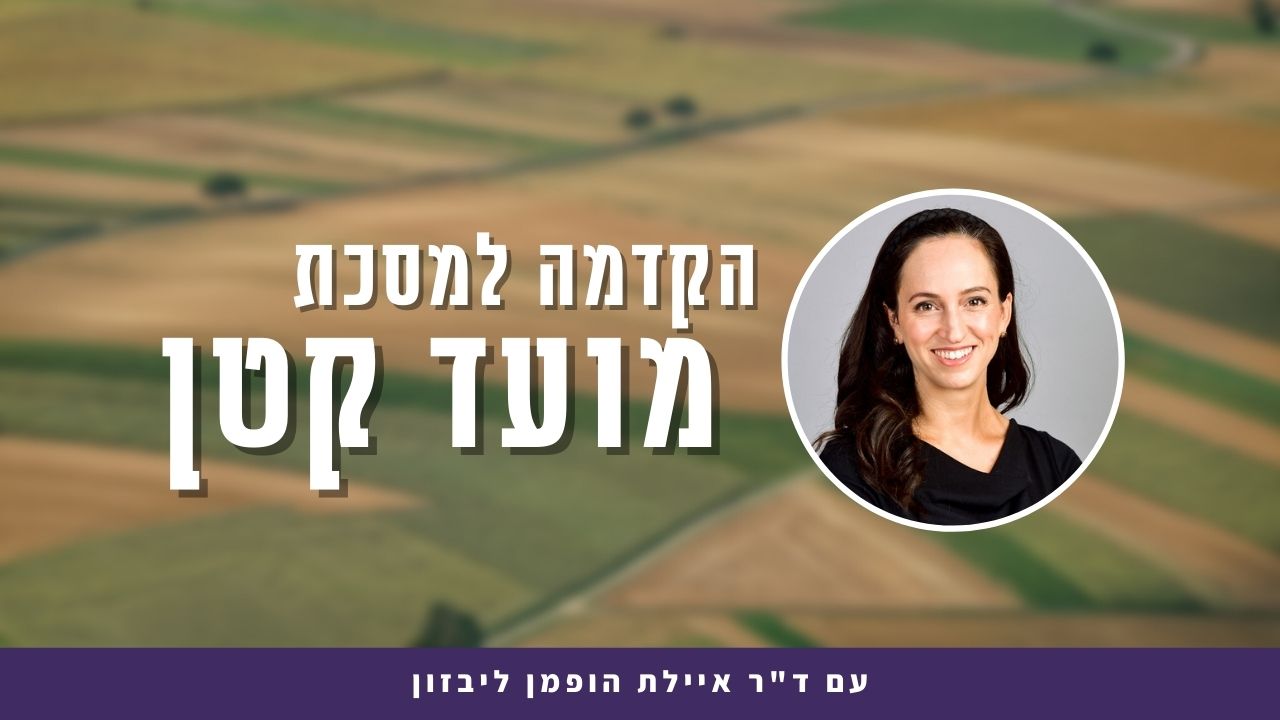מועד קטן כב
הָלַךְ גְּדוֹל הַבַּיִת לְבֵית הַקְּבָרוֹת, מַהוּ?
If the principal member of the household went with the remains of the deceased to the cemetery and did not return for several days, what is the halakha? If another mourner came to the house of mourning during his absence, does he follow the principal member of the household and count from the time of the burial, or does he count from the time that the funeral procession departed, like the other members of the household?
תָּא שְׁמַע, דְּאָמַר רַבִּי חִיָּיא בַּר אַבָּא אָמַר רַבִּי יוֹחָנָן: אֲפִילּוּ הָלַךְ גְּדוֹל הַבַּיִת לְבֵית הַקְּבָרוֹת — מוֹנֶה עִמָּהֶן. מוֹנֶה עִמָּהֶן? וְהָתַנְיָא מוֹנֶה לְעַצְמוֹ!
The Gemara answers: Come and hear that which Rabbi Ḥiyya bar Abba said that Rabbi Yoḥanan said: Even if the principal member of the household went to the cemetery, the mourner who comes home during his absence counts with them, i.e., the other members of the household who did not go to the cemetery. The Gemara asks: Does he really count and complete his mourning with them? But isn’t it taught otherwise in a baraita, that he counts seven days on his own?
לָא קַשְׁיָא: הָא דַּאֲתָא בְּגוֹ תְּלָתָא, וְהָא דְּלָא אֲתָא בְּגוֹ תְּלָתָא. כִּי הָא דַּאֲמַר לְהוּ רַב לִבְנֵי הַצַּלְבּוֹנִי: דְּאָתוּ בְּגוֹ תְּלָתָא — לִימְנוֹ בַּהֲדַיְיכוּ, דְּלָא אָתוּ בְּגוֹ תְּלָתָא — לִימְנוֹ לְנַפְשַׁיְהוּ.
The Gemara answers: This is not difficult. This statement, that he counts with them, is referring to a case where the principal member of the household came home within three days. And the other ruling, that he counts on his own, is referring to a case where he did not come home within three days. This conclusion is similar to what Rav said to the sons of Hatzleponi when they were in mourning: Those who come home within three days should count with you; whereas those who do not come home within three days should count on their own.
אֲמַר לְהוּ רָבָא לִבְנֵי מָחוֹזָא: אַתּוּן דְּלָא אָזְלִיתוּ בָּתַר עַרְסָא, מִכִּי מְהַדְּרִיתוּ אַפַּיְיכוּ מִבָּבָא דַאֲבוּלָּא — אַתְחִילוּ מְנוֹ.
Rava said to the people of Meḥoza: Those of you who do not follow the coffin all the way to the place of interment should begin counting your days of mourning from when you turn your faces from the city gates to return home. Since the dead were commonly transported long distances and buried far away, most of the mourners did not accompany their deceased relatives to the actual site of burial.
רַבִּי שִׁמְעוֹן אוֹמֵר: אֲפִילּוּ בָּא בַּיּוֹם הַשְּׁבִיעִי מִמָּקוֹם קָרוֹב — מוֹנֶה עִמָּהֶן. אָמַר רַבִּי חִיָּיא בַּר גַּמָּדָא אָמַר רַבִּי יוֹסֵי בֶּן שָׁאוּל אָמַר רַבִּי: וְהוּא שֶׁבָּא וּמָצָא מְנַחֲמִין אֶצְלוֹ.
§ The Gemara cites the baraita taught above: Rabbi Shimon says: Even if one of the mourners came on the seventh day from a nearby place, he counts with the other mourners and completes the seven-day period of mourning with them. Rabbi Ḥiyya bar Gamda said that Rabbi Yosei ben Shaul said that Rabbi Yehuda HaNasi said: And this is the halakha, provided that he came and found consolers still present in the house.
בָּעֵי רַב עָנָן: נִנְעֲרוּ לַעֲמוֹד וְלֹא עָמְדוּ, מַהוּ? תֵּיקוּ.
§ Rav Anan asks: If the consolers had already stirred themselves to stand up and leave but did not yet actually stand up and leave, what is the halakha? Is it considered as if the consolers have already left or not? This question was not answered, and the dilemma stands unresolved.
גְּמִירִי חַבְרֵיהּ דְּרַבִּי אַבָּא בַּר חִיָּיא מֵרַבִּי אַבָּא, וּמַנּוּ — רַבִּי זֵירָא, וְאָמְרִי לַהּ: חַבְרֵיהּ דְּרַבִּי זֵירָא מֵרַבִּי זֵירָא, וּמַנּוּ — רַבִּי אַבָּא בְּרֵיהּ דְּרַבִּי חִיָּיא בַּר אַבָּא, אָמַר רַבִּי יוֹחָנָן: הֲלָכָה כְּרַבָּן שִׁמְעוֹן בֶּן גַּמְלִיאֵל בִּטְרֵיפוֹת, וַהֲלָכָה כְּרַבִּי שִׁמְעוֹן בְּאֵבֶל.
The Gemara relates that a colleague of Rabbi Abba bar Ḥiyya learned the following principle as a tradition from Rabbi Abba. The Gemara asks: And who was this colleague? It was Rabbi Zeira. And some say a different version of this tradition: A colleague of Rabbi Zeira learned a tradition from Rabbi Zeira. The Gemara asks: And who is this colleague? It was Rabbi Abba, son of Rabbi Ḥiyya bar Abba: Rabbi Yoḥanan said: The halakha is in accordance with the opinion of Rabban Shimon ben Gamliel with regard to an animal that is unsuitable for human consumption because of severe organic disease or congenital defect, making it a tereifa, and the halakha is in accordance with the opinion of Rabbi Shimon with regard to the halakhot of mourning.
כְּרַבִּי שִׁמְעוֹן בְּאֵבֶל — הָא דַּאֲמַרַן. כְּרַבָּן שִׁמְעוֹן בֶּן גַּמְלִיאֵל בִּטְרֵיפוֹת — דִּתְנַן: בְּנֵי מֵעַיִם שֶׁנִּיקְּבוּ וְלֵיחָה סוֹתַמְתָּן — כְּשֵׁרָה, דִּבְרֵי רַבָּן שִׁמְעוֹן בֶּן גַּמְלִיאֵל.
The Gemara explains: The halakha is in accordance with the opinion of Rabbi Shimon with regard to mourning, concerning that which we just said about a mourner who arrives on the seventh day. The halakha is in accordance with the opinion of Rabban Shimon ben Gamliel with regard to defects in animals that render them tereifa concerning that which we learned in a baraita: If the animal’s intestines became perforated, but the hole was stopped up by mucus, so that nothing comes out of this hole, the animal is fit. Unlike an ordinary hole in the intestines, this hole does not render the animal a tereifa and make it unfit for consumption. This is the statement of Rabban Shimon ben Gamliel.
מַאי לֵיחָה? אָמַר רַב כָּהֲנָא: שִׁירְקָא דִמְעַיָּא דְּנָפֵיק אַגַּב דּוּחְקָא. אָמַר מַאן דְּהוּא: אִיזְכֵּי וְאֶיסַּק וְאֶגְמְרַהּ לִשְׁמַעְתָּא מִפּוּמֵּיהּ דְּמָרַיהּ,
The Gemara asks: What is this mucus? Rav Kahana said: The fat [shirka] of the intestines that comes out under pressure. Someone whose name was not given said: May I merit to go up to Eretz Yisrael and learn this halakha from the mouth of its author.
כִּי סְלֵיק, אַשְׁכְּחֵיהּ לְרַבִּי אַבָּא בְּרֵיהּ דְּרַבִּי חִיָּיא בַּר אַבָּא. אֲמַר לֵיהּ: אֲמַר מָר: הֲלָכָה כְּרַבָּן שִׁמְעוֹן בֶּן גַּמְלִיאֵל בִּטְרֵיפוֹת? אֲמַר לֵיהּ: אֲנָא ״אֵין הֲלָכָה״ אֲמַרִי.
When he went up from Babylonia to Eretz Yisrael, he found Rabbi Abba, son of Rabbi Ḥiyya bar Abba, and said to him: Did the Master say that the halakha is in accordance with the opinion of Rabban Shimon ben Gamliel with regard to defects that render the animal a tereifa? He said to him: I said just the opposite, namely, that the halakha is not in accordance with Rabban Shimon ben Gamliel, and therefore such a hole in the animal’s intestine makes it unfit for eating.
כְּרַבִּי שִׁמְעוֹן בְּאֵבֶל, מַאי? אֲמַר לֵיהּ: פְּלוּגְתָּא נִינְהוּ, דְּאִיתְּמַר, רַב חִסְדָּא אָמַר: הֲלָכָה, וְכֵן אָמַר רַבִּי יוֹחָנָן: הֲלָכָה. רַב נַחְמָן אָמַר: אֵין הֲלָכָה.
He asked him again: What about the other ruling reported in your name, that the halakha is in accordance with the opinion of Rabbi Shimon with regard to mourning? Is this accurate? He said to him: This issue is subject to dispute, as it was stated: Rav Ḥisda said: The halakha is in accordance with the opinion of Rabbi Shimon, and similarly Rabbi Yoḥanan said: It is the halakha. But Rav Naḥman said: It is not the halakha.
וְאֵין הֲלָכָה כְּרַבָּן שִׁמְעוֹן בֶּן גַּמְלִיאֵל בִּטְרֵיפוֹת, וַהֲלָכָה כְּרַבִּי שִׁמְעוֹן בְּאֵבֶל. דְּאָמַר שְׁמוּאֵל: הֲלָכָה כְּדִבְרֵי הַמֵּיקֵל בְּאֵבֶל.
The Gemara concludes: The halakha is not in accordance with the opinion of Rabban Shimon ben Gamliel with regard to the aforementioned issue of tereifa, and the halakha is in accordance with Rabbi Shimon with regard to mourning, as Shmuel stated a principle: The halakha follows the opinion of the more lenient authority in matters relating to mourning.
עַל כׇּל הַמֵּתִים כּוּלָּן מְדַחֶה מִטָּתוֹ — הֲרֵי זֶה מְשׁוּבָּח. עַל אָבִיו וְעַל אִמּוֹ — הֲרֵי זֶה מְגוּנֶּה, הָיָה עֶרֶב שַׁבָּת אוֹ עֶרֶב יוֹם טוֹב — הֲרֵי זֶה מְשׁוּבָּח, שֶׁאֵינוֹ עוֹשֶׂה אֶלָּא לִכְבוֹד אָבִיו וְאִמּוֹ.
§ It was taught in a baraita: With regard to all other deceased relatives, it is praiseworthy for one to be quick in taking the bier out for burial. But in the case of one’s father or mother, acting in this manner is condemnable, as one should draw out the period of acute mourning for his parent. If, however, it was Friday or the eve of a Festival, then one is praiseworthy for expediting his parent’s burial because he does this only out of respect for his father or mother, as he does not want them to remain unburied for the duration of Shabbat or the Festival.
עַל כׇּל הַמֵּתִים כּוּלָּן, רָצָה — מְמַעֵט בְּעִסְקוֹ, רָצָה — אֵינוֹ
With regard to all other dead, if the mourner wishes he may reduce his business due to mourning. If, however, he wishes not to do so, he need not
מְמַעֵט, עַל אָבִיו וְעַל אִמּוֹ — מְמַעֵט.
reduce it. In the case of his father or mother, he must always reduce his business.
עַל כׇּל הַמֵּתִים כּוּלָּן, רָצָה — חוֹלֵץ, רָצָה — אֵינוֹ חוֹלֵץ. עַל אָבִיו וְעַל אִמּוֹ — חוֹלֵץ.
With regard to all other deceased relatives, if the mourner wishes, he may remove his garment from one of his shoulders, and if he wishes not to remove it, he need not remove it. However, in the case of his father or mother, he must always remove his garment from one of his shoulders.
וּמַעֲשֶׂה בִּגְדוֹל הַדּוֹר אֶחָד שֶׁמֵּת אָבִיו וּבִיקֵּשׁ לַחְלוֹץ, וּבִיקֵּשׁ גְּדוֹל הַדּוֹר אַחֵר שֶׁעִמּוֹ לַחְלוֹץ, וְנִמְנַע וְלֹא חָלַץ.
There was an incident when the father of a leading authority of his generation died, and the authority wished to remove his garment from one shoulder. Another leading authority of the generation also wished to remove his own garment together with him, in order to join him in his mourning, but due to this the first person refrained and did not remove his garment, so that his colleague would not remove his garment as well.
אָמַר אַבָּיֵי: גְּדוֹל הַדּוֹר — רַבִּי, גְּדוֹל הַדּוֹר שֶׁעִמּוֹ — רַבִּי יַעֲקֹב בַּר אַחָא. וְאִיכָּא דְּאָמְרִי: גְּדוֹל הַדּוֹר — רַבִּי יַעֲקֹב בַּר אַחָא, גְּדוֹל הַדּוֹר שֶׁעִמּוֹ — רַבִּי.
Abaye said: The leading authority of the generation mentioned here is Rabbi Yehuda HaNasi, and the leading authority of the generation who was with him was Rabbi Ya’akov bar Aḥa. And some say: The leading authority of the generation was Rabbi Ya’akov bar Aḥa, and the leading authority of the generation who was with him was Rabbi Yehuda HaNasi.
בִּשְׁלָמָא לְמַאן דְּאָמַר גְּדוֹל הַדּוֹר שֶׁעִמּוֹ — רַבִּי, הַיְינוּ דְּנִמְנַע וְלֹא חָלַץ,
The Gemara examines this issue: Granted, according to the one who said that the leading authority of the generation who was with him was Rabbi Yehuda HaNasi, this is the reason that he refrained and did not remove his garment from his shoulder. That is to say, Rabbi Ya’akov bar Aḥa refrained from doing so because he did not wish to cause the Nasi to remove his own garment.
אֶלָּא לְמַאן דְּאָמַר רַבִּי יַעֲקֹב בַּר אַחָא, אַמַּאי נִמְנַע וְלֹא חָלַץ? רַבָּן שִׁמְעוֹן בֶּן גַּמְלִיאֵל נָשִׂיא הֲוָה, וְכוּלֵּי עָלְמָא מִיחַיְּיבִי לְמִיחְלַץ! קַשְׁיָא.
But according to the one who said that it is Rabbi Ya’akov bar Aḥa who was the leader of the generation with him, why did Rabbi Yehuda HaNasi refrain and not remove his garment from his shoulder? Rabban Shimon ben Gamliel, the father of Rabbi Yehuda HaNasi, was also the Nasi, and everyone is required to remove his garment from his shoulder for him, as was the accepted practice. Therefore, Rabbi Ya’akov bar Aḥa would also have been required to bare his shoulder. Why, then, did Rabbi Yehuda HaNasi prevent him from doing so? The Gemara concludes: Indeed this is difficult.
עַל כׇּל הַמֵּתִים כּוּלָּן מִסְתַּפֵּר לְאַחַר שְׁלֹשִׁים יוֹם, עַל אָבִיו וְעַל אִמּוֹ — עַד שֶׁיִּגְעֲרוּ בּוֹ חֲבֵרָיו. עַל כׇּל הַמֵּתִים כּוּלָּן נִכְנָס לְבֵית הַשִּׂמְחָה לְאַחַר שְׁלֹשִׁים יוֹם, עַל אָבִיו וְעַל אִמּוֹ — לְאַחַר שְׁנֵים עָשָׂר חֹדֶשׁ.
§ The Gemara returns to the continuation of the baraita: With regard to all deceased relatives except for parents, one may cut his hair after thirty days. In the case of one’s father or mother, one may not cut his hair until his colleagues have rebuked him for his hair being too long. With regard to all other deceased relatives, he may enter a place where a joyous celebration is taking place after thirty days; in the case of his father or mother, he may enter such a place only after twelve months.
אָמַר רַבָּה בַּר בַּר חָנָה: וּלְשִׂמְחַת מְרֵיעוּת. מֵיתִיבִי: וּלְשִׂמְחָה וְלִמְרֵיעוּת שְׁלֹשִׁים יוֹם. קַשְׁיָא.
Rabba bar bar Ḥana said: The ruling that a mourner may enter a house of joy after thirty days applies specifically to a joyous social gathering, that is to say, to the joyous meals that a group of friends would eat together, each taking a turn hosting. But this ruling does not apply to a large joyous occasion, such as a wedding feast. The Gemara raises an objection from a baraita which adds: And also for joyous social gatherings, thirty days. This implies that when the baraita speaks of joyous celebrations without further specification, it is not referring to joyous social gatherings, but even to weddings and other joyous occasions. The Gemara concludes: Indeed, it is difficult.
אַמֵּימָר מַתְנֵי הָכִי, אָמַר רַבָּה בַּר בַּר חָנָה: וּלְשִׂמְחַת מְרֵיעוּת מוּתָּר לִיכָּנֵס לְאַלְתַּר. וְהָא תַּנְיָא: לְשִׂמְחָה שְׁלֹשִׁים, וְלִמְרֵיעוּת שְׁלֹשִׁים!
Ameimar taught the previous discussion as follows: Rabba bar bar Ḥana said an alternative version of the discussion: For a joyous social gathering one is permitted to enter immediately. The Gemara poses a question: But isn’t it taught in a baraita: For joyous celebrations and for joyous social gatherings, one must wait thirty days?
לָא קַשְׁיָא: הָא בַּאֲרִיסוּתָא, הָא בְּפוּרְעֲנוּתָא.
The Gemara answers: This is not difficult. This ruling, of the baraita, is referring to an initial gathering, when the mourner is the first in the group of friends to host. The baraita teaches that in such a situation the mourner is required to wait thirty days before doing so. That ruling, of Rabba bar bar Ḥana, is referring to a reciprocal gathering. The mourner’s friends have already hosted these gatherings, and now it is his turn to host. Since he is required to host such a gathering for his colleagues, he need not postpone it. Rather, he may host the group immediately.
עַל כׇּל הַמֵּתִים כּוּלָּן קוֹרֵעַ טֶפַח, עַל אָבִיו וְעַל אִמּוֹ עַד שֶׁיְּגַלֶּה אֶת לִבּוֹ. אָמַר רַבִּי אֲבָהוּ, מַאי קְרָא: ״וַיַּחֲזֵק דָּוִד בִּבְגָדָיו וַיִּקְרָעֵם״, וְאֵין אֲחִיזָה פָּחוֹת מִטֶּפַח.
The baraita continues: With regard to all other deceased relatives, one rends his garment the length of a handbreadth, and that suffices. In the case of his father or mother, he must rend his garment until he reveals his heart. Rabbi Abbahu said: What is the verse that teaches that the rent must be a handbreadth? “And David took hold of his clothes and rent them” (II Samuel 1:11), and taking hold cannot be done for a garment less than a handbreadth.
עַל כׇּל הַמֵּתִים כּוּלָּן אֲפִילּוּ לָבוּשׁ עֲשָׂרָה חֲלוּקִין — אֵינוֹ קוֹרֵעַ אֶלָּא עֶלְיוֹן, עַל אָבִיו וְעַל אִמּוֹ — קוֹרֵעַ אֶת כּוּלָּן. וְאַפִּיקָרְסוּתוֹ אֵינָהּ מְעַכֶּבֶת.
The baraita teaches further: With regard to all other deceased relatives, even if he is wearing ten garments, one on top of the other, he rends only his outer garment. But in the case of his father or mother, he must rend them all. Failure to rend his undergarment, however, does not invalidate the fulfillment of the mitzva.
אֶחָד הָאִישׁ וְאֶחָד אִשָּׁה. רַבִּי שִׁמְעוֹן בֶּן אֶלְעָזָר אוֹמֵר: הָאִשָּׁה קוֹרַעַת אֶת הַתַּחְתּוֹן וּמַחְזִירָתוֹ לַאֲחוֹרֶיהָ, וְחוֹזֶרֶת וְקוֹרַעַת אֶת הָעֶלְיוֹן.
Both a man and a woman are required to rend their garments. Rabbi Shimon ben Elazar says: A woman first rends her inner garment and turns it around, so that the tear is on her back. And only afterward does she rend her outer garment, so that she does not expose her chest.
עַל כׇּל הַמֵּתִים כּוּלָּן, רָצָה — מַבְדִּיל קַמֵּי שָׂפָה שֶׁלּוֹ, רָצָה — אֵינוֹ מַבְדִּיל. עַל אָבִיו וְעַל אִמּוֹ — מַבְדִּיל.
With regard to all other deceased relatives, if one wishes he may rip apart his garment on the hem, rather than merely expanding the neck hole, so that the tear stands out distinctly from the opening of the garment. If he wishes not to do this, he does not rip apart the hem in this manner. That is to say, one may simply enlarge the neck hole, although rending a garment in this way makes the tear less prominent. In the case of one’s father or mother, however, he must always rip apart the hem.
רַבִּי יְהוּדָה אוֹמֵר: כׇּל קְרִיעָה שֶׁאֵינוֹ מַבְדִּיל קַמֵּי שָׂפָה שֶׁלּוֹ — אֵינוֹ אֶלָּא קֶרַע שֶׁל תִּיפְלוּת. אָמַר רַבִּי אֲבָהוּ: מַאי טַעְמָא דְּרַבִּי יְהוּדָה, דִּכְתִיב: ״וַיַּחֲזֵק בִּבְגָדָיו וַיִּקְרָעֵם לִשְׁנַיִם קְרָעִים״, מִמַּשְׁמַע שֶׁנֶּאֱמַר ״וַיִּקְרָעֵם״ אֵינִי יוֹדֵעַ שֶׁהֵן לִשְׁנַיִם? אֶלָּא שֶׁנִּרְאִין קְרוּעִים כִּשְׁנַיִם.
Rabbi Yehuda says: Any rending that does not rip apart his garment on the hem of the garment is nothing other than a frivolous rent of no significance, as it must be evident that one has rent his garment in mourning and that the rent is not merely an imperfection in the garment. Rabbi Abbahu said: What is the reason for Rabbi Yehuda’s opinion? As it is written: “And he took hold of his own clothes and he rent them in two pieces” (II Kings 2:12). From that which is stated: “And he rent,” do I not know that he rent them in two? Rather, these words teach that the rent clothes must appear as if they were torn into two pieces, i.e., the tear must be obvious and visible.
עַל כׇּל הַמֵּתִים כּוּלָּן שׁוֹלֵל לְאַחַר שִׁבְעָה, וּמְאַחֶה לְאַחַר שְׁלֹשִׁים. עַל אָבִיו וְעַל אִמּוֹ — שׁוֹלֵל לְאַחַר שְׁלֹשִׁים וְאֵינוֹ מְאַחֶה לְעוֹלָם. וְהָאִשָּׁה שׁוֹלַלְתּוֹ לְאַלְתַּר מִפְּנֵי כְּבוֹדָהּ.
The baraita continues: With regard to all other deceased relatives, one may tack the tear with rough stitches after seven days, and one may join the edges more carefully after thirty days. But in the case of one’s father or mother, he may tack the tear only after thirty days, and he may never again join the edges more carefully. A woman, however, may tack the tear immediately, due to her honor, for it would be dishonorable for her to be seen with torn garments.
כִּי אֲתָא רָבִין אָמַר רַבִּי יוֹחָנָן: עַל כׇּל הַמֵּתִים, רָצָה — קוֹרֵעַ בַּיָּד, רָצָה — קוֹרֵעַ בִּכְלִי. עַל אָבִיו וְעַל אִמּוֹ — בַּיָּד.
When Ravin came from Eretz Yisrael to Babylonia, he said that Rabbi Yoḥanan said: With regard to all other deceased relatives, if one wishes, he may rend his garment with his hand; and if he wishes, he may rend it with a utensil in a way that will preserve it. But in the case of his father or mother, he must rend his garment with his hand in a manner that will utterly ruin it.
וְאָמַר רַבִּי חִיָּיא בַּר אַבָּא אָמַר רַבִּי יוֹחָנָן: עַל כׇּל הַמֵּתִים כּוּלָּן — מִבִּפְנִים, עַל אָבִיו וְעַל אִמּוֹ — קוֹרֵעַ מִבַּחוּץ. אֲמַר רַב חִסְדָּא: וְכֵן לַנָּשִׂיא.
And Rabbi Ḥiyya bar Abba said that Rabbi Yoḥanan said: With regard to all other deceased relatives, one rends his garment on the inside, meaning, he rends his inner garment and not necessarily his outermost garment. In the case of one’s father or mother, however, he must rend the garment on the outside, i.e., the outermost garment. Rav Ḥisda said: And likewise, over a Nasi, one is required to rend his garment as he does over his father.
מֵיתִיבִי: לֹא הוּשְׁווּ לְאָבִיו וּלְאִמּוֹ אֶלָּא לְאִיחוּי בִּלְבַד.
The Gemara raises an objection from a baraita in which it was taught: The halakhot of rending for the death of other people referred to in the baraita, e.g., a Nasi, a president of the court, or one’s teacher, were likened to the halakhot of rending for one’s father or mother only with regard to the issue of carefully rejoining the edges of the rent, as in all of these cases it is prohibited to mend one’s garment with precise stitches.
מַאי לָאו, אֲפִילּוּ לְנָשִׂיא? לָא, לְבַר מִנָּשִׂיא.
What, is this baraita not also referring even to one who rends his garment for the Nasi? The Gemara rejects this: No, the baraita is referring to the other people, aside from one who rends his garment for the Nasi, as rending for the Nasi is the same as rending for one’s father with regard to all aspects of the rending.
נְשִׂיאָה שְׁכֵיב, אֲמַר לֵיהּ רַב חִסְדָּא לְרַב חָנָן בַּר רָבָא: כְּפִי אֲסִיתָא וְקוּם עֲלַהּ, וְאַחְוִי קְרִיעָה לְעָלְמָא.
It was related that the Nasi died, and Rav Ḥisda said to Rav Ḥanan bar Rava: Turn the mortar over and stand on it, and show the rent to everyone. Everyone will then rend his garment in this manner, as everyone is required to rend his garment over the death of the Nasi.
עַל חָכָם חוֹלֵץ מִיָּמִין, עַל אָב בֵּית דִּין מִשְּׂמֹאל, עַל נָשִׂיא מִכָּאן וּמִכָּאן.
§ It was further taught: For mourning a Sage, one removes his garment from the right shoulder. For the president of the court he removes his garment from the left shoulder. For the Nasi he removes his garment from here and from here, from both shoulders.
תָּנוּ רַבָּנַן: חָכָם שֶׁמֵּת — בֵּית מִדְרָשׁוֹ בָּטֵל, אַב בֵּית דִּין שֶׁמֵּת — כׇּל בָּתֵּי מִדְרָשׁוֹת שֶׁבְּעִירוֹ בְּטֵילִין. וְנִכְנָסִין לְבֵית הַכְּנֶסֶת וּמְשַׁנִּין אֶת מְקוֹמָן: הַיּוֹשְׁבִין בַּצָּפוֹן — יוֹשְׁבִין בַּדָּרוֹם, הַיּוֹשְׁבִין בַּדָּרוֹם — יוֹשְׁבִין בַּצָּפוֹן. נָשִׂיא שֶׁמֵּת — בָּתֵּי מִדְרָשׁוֹת כּוּלָּן בְּטֵילִין, וּבְנֵי הַכְּנֶסֶת נִכְנָסִין לְבֵית הַכְּנֶסֶת
The Sages taught the following baraita: When a Sage dies, his study hall ceases its regular study as a sign of mourning over him. When the president of the court dies, all of the study halls in his city cease their regular study, and everyone enters the synagogue and changes their places there as a sign of mourning over him. Those who ordinarily sit in the north should sit in the south, and those who ordinarily sit in the south should sit in the north. When a Nasi dies, all study halls cease their regular study. On Shabbat, the members of the synagogue enter the synagogue for public Torah reading, which requires a congregation of ten,

